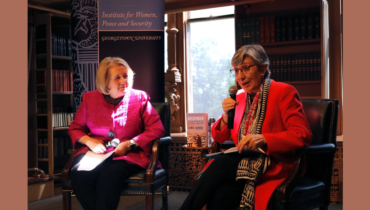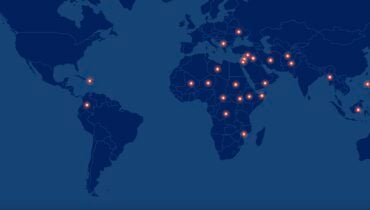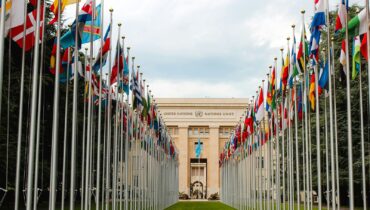“I call on every government, in every country, to make gender apartheid a crime against humanity,” said Nobel Laureate and education activist Malala Yousafzai while delivering the Nelson Mandela Annual Lecture this week in South Africa.
Malala made the case that the Taliban’s appalling and systemic violations of the rights of Afghan women and girls amount to gender apartheid and cannot be addressed by existing international mechanisms alone. Accountability for this unspeakable oppression will require a new toolkit, which activists, human rights experts, and scholars believe could be provided by recognizing gender apartheid as a crime against humanity. Codified in response to the segregation and oppression of Black South Africans by white South Africans between 1948 and 1994, apartheid is recognized as a crime against humanity in the Rome Statute and Convention on the Suppression and Punishment of the Crime of Apartheid and defined as the systemic oppression of one or more racial groups by another racial group. This legal framework could be easily broadened to account for the systematic oppression of women.
The deliberate erasure of women’s rights by the Taliban is not an incidental byproduct of their rule, but rather a fundamental tenet of it. Since their takeover in 2021, the Taliban have demonstrated that women’s subjugation is central to their form of governance and their policies have targeted every sphere of Afghan women’s public and private life. The Taliban have banned women from working in the public sector, private businesses, and even for NGOs and UN agencies. They have banned girls from school beyond the sixth grade and, in some cases, as early as age ten. With these severe restrictions and Taliban edicts mandating that women and girls travel with a male chaperone (mahram), the Taliban have effectively confined women to their homes, and relegated them to the status of second-class citizens. The Taliban’s policies have created an unparalleled and “unprecedented” crisis that existing international law is ill-equipped to address or rectify–but framing these policies as a form of apartheid could expand the legal mechanisms available to the international community to hold the Taliban accountable.
As the international community searches for means to improve the conditions of Afghan women, tools designed to eliminate gender-based discrimination will be insufficient, given the scope of the Taliban’s crimes. Gender-based discrimination is defined by the Convention for the Elimination of Discrimination Against Women (CEDAW) as “…any distinction, exclusion or restriction made on the basis of sex which has the effect or purpose of impairing or nullifying the recognition, enjoyment or exercise by women, irrespective of their marital status, on a basis of equality of men and women, of human rights and fundamental freedoms in the political, economic, social, cultural, civil or any other field.” While an important framework, the label of gender-based discrimination does not fully capture the severity or systematic nature of the Taliban’s abuse.
Parallels between race-based apartheid in South Africa and the gender-based persecution perpetrated by the Taliban in Afghanistan are striking and demonstrate the potential of utilizing an apartheid legal framework to more effectively address the severity and systemic nature of the Taliban’s abuse of women.
The robust and effective international response to racial apartheid demonstrates how such legal frameworks can catalyze action and end harmful practices. In the case of South Africa, the explicit codification of discriminatory policies prompted widespread condemnation of the country’s racial apartheid system, leading to diplomatic and economic sanctions against the apartheid regime. The resulting isolation and pressure from the international community further weakened the regime, mobilizing concerted efforts to dismantle the oppressive system. The international community should consider how using an apartheid legal framework to understand the Taliban’s codification of discriminatory gender policies could mobilize widespread condemnations, compel global interventions, and apply pressure on those involved or complicit in these atrocities.
The stark reality of what has unfolded in Afghanistan over the past two years underscores the inadequacy of current tools and approaches in rectifying apartheid-like policies and actions that target women and girls. This crisis demands a paradigm shift: recognition of gender apartheid as a crime against humanity would obligate international action and collaboration to end the practice. Understanding state-sanctioned gender-based discrimination as a form of gender apartheid, and a crime against humanity, may represent the most comprehensive and effective approach to tackling the situation faced by Afghan women and girls, and is not beyond reach. As the United Nations General Assembly’s Sixth Committee continues to edit its draft Convention on the Prevention and Punishment of Crimes Against Humanity, the international community should advocate for gender apartheid’s recognition and inclusion in the new convention.
RECOMMENDATIONS
- Urge the Sixth Committee to include gender apartheid in their draft Convention on the Prevention and Punishment of Crimes Against Humanity. To dismantle this unique, systematic oppression, gender apartheid must be recognized as a crime against humanity in forthcoming treaties and conventions produced by the Sixth Committee. Member States should continue to use their authorities to submit written comments in support of gender apartheid’s inclusion in the convention and advocate for its inclusion during future discussions, including during this week’s Sixth Committee meeting.
- Update international legal mechanisms to eradicate gender apartheid. International legal mechanisms should be adopted to specifically address gender apartheid via the International Criminal Court or separate, specially designed international courts. The international community should also explore how existing, race-based apartheid law can apply to instances of gender apartheid by substituting language. Recognizing the Taliban’s systemic oppression of women as a crime against humanity and revising international legal mechanisms to prosecute gender apartheid are crucial steps to protect the rights of Afghan women and girls.
- Encourage Member States to use the term gender apartheid when describing the situation in Afghanistan. The Human Rights Council’s Special Rapporteur on the situation of human rights in Afghanistan concluded that the Taliban’s actions “may amount to gender apartheid” and experts including the executive director of UN Women asked the UN Security Council to use the label gender apartheid to help reverse the Taliban’s policies. By replicating this language, Member States can mobilize action through the term’s normative impact.
- Utilize existing international gender policy frameworks as interim mechanisms to address gender apartheid. Swift action is crucial: as the international community develops tools specific to gender apartheid, existing tools that can promote accountability should be leveraged. The human rights treaties that Afghanistan is a party to–especially the Convention on the Elimination of All Forms of Discrimination Against Women–should be enforced, and the international community should investigate the Taliban’s violations of such treaties through international courts.
- Continue to prioritize the fundamental rights of Afghan women and girls in international fora. Sustained focus is essential for meaningful progress. Amid pressing global crises, maintaining this commitment is crucial for improving the lives of millions.
(Photo Credit: Wasim Mirzaie)


